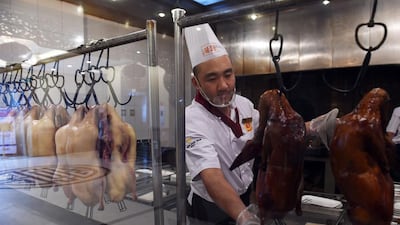Where does Peking duck come from? It is a trick question: the dish named for China’s capital has its origins in Nanjing, hundreds of kilometres to the south.
This is one of the revelations found in a museum opened earlier this month to mark the 150th anniversary of the Quanjude restaurant, now the seven-storey flagship of a chain with franchises as far afield as Australia.
Statues of roasters, photos of officials dining and menus going back 100 years trace the duck’s route from humble waterfowl to culinary institution.
No secret ingredients are revealed, but about 20 models detail each stage of the duck’s journey to the plate. Slaughtered when it weighs about three kilograms and pumped full of air to separate skin from fat, the bird is then gutted and filled with boiling water to help a sweet basting syrup penetrate the meat before being dried, coated and roasted.
“The baking time is about 50 minutes,” a museum panel reads. “The roast duck coming out of the oven looks plump, in a colour of jujube red all over its body, full of oily lustre, with a crisp skin, a fresh and tender mouthfeel, tasting delicious but not oily, bearing a subtle fragrance of the fruit tree.”
A roast-duck style was first developed in the court kitchens of Nanjing, China’s former capital in the eastern province of Jiangsu. The dish only came to Beijing when the Ming dynasty Yongle emperor moved his seat north in the 15th century.
Fuchsia Dunlop, a British writer who specialises in Chinese food, describes today’s Peking duck as “a more recent innovation”.
“When Quanjude was set up in 1864, the guy who started it employed some chefs who worked in the imperial palace and they used this hanging-up technique from imperial kitchens to roast the duck,” she says.
“It’s a clay oven, with the ducks hanging inside, with a fruit wood fire in the mouth of the oven.”
Once cooked, the bird is dissected at the table by a skilled chef, his hands usually protected from the heat only by flimsy plastic gloves as he reduces the carcass to precise sections of meat and slivers of crispy skin.
“If he has a good cut, he can cut it into a hundred slices,” says Dunlop.
At the restaurant, diner He Yufan says: “When I watch the chef cut it, he makes it look like art. That’s why it feels good to eat it.”
Her friend Guo Jin was indifferent to the birthplace of the dish. “Beijing is the only place in the world that has authentic Peking duck,” she says.
According to Quanjude, which boasts of having sold 196 million ducks around the world, the dish has played its part in Chinese international relations.
Chefs would accompany Chinese diplomatic missions. Museum pictures show Henry Kissinger and Richard Nixon eating duck during a landmark visit to China in 1972.
“Ping-pong diplomacy, Maotai diplomacy and roast duck diplomacy were once called the three great diplomatic manoeuvres of China by (the former premier) Zhou Enlai,” a museum panel reads. On one occasion, Zhou dined with Charlie Chaplin in 1954 in Geneva, where the British actor was living in exile from the United States after questions were raised over his alleged Communist sympathies.
“I have a special feeling for ducks,” Chaplin is quoted as telling Zhou. “I created a character who is hilarious when walking and his posture is from the duck, so I do not eat duck as a rule. But I will break then rules this time.”
According to Dunlop, the Quanjude museum is part of a nationwide trend to showcase China’s gastronomic traditions.
She attributes the phenomenon to a popular television programme, A Bite of China, that highlighted regional cuisines and dishes.
The show “encouraged people to stop taking it for granted, showed them it’s something to be proud of and learn about, and tell the outside world about”, she said.
It “seems to have really awakened Chinese people up to the fact that they have an amazing food culture and it’s part of their heritage”.

